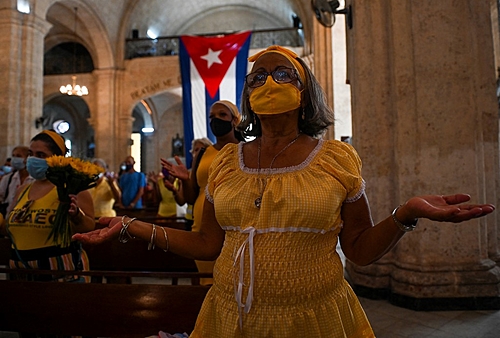
When walking through the streets of Havana, it is common to see people wearing clothes that express the cultures and regions of the African diaspora in the Americas. In Cuba, black and African roots coexist with Christian traditions, blending into the urban landscape that is increasingly filled with images of evangelical churches.
Between the 6th and 9th of April, like millions of Christians around the world, Holy Week is celebrated in the Caribbean country. It is estimated that 60% of the Cuban population is baptized in the Catholic Church.
“It is common to find people who were baptized, but at the same time were initiated in Santeria. People who perhaps consider themselves Christians, but who celebrate festivities such as Santa Bárbara’s day, or Changó, belonging to the Yoruba tradition”, explains Ileana Hodge Limonta, one of the most prominent scholars of religious affairs and current director of the Center for Psychological and Sociological Research (CIPS).
For Ileana, the concept of religious syncretism is not enough to describe the religious complexity in Cuba, but she claims that it is possible to speak of a Cuban multireligiosity.
“Cubans express a lot of spirituality, not always in the Lord Jesus Christ. This has been manifested throughout all these years of history through their own practices, festivities and meetings that maintain what we believe in as Cubans. Our own idiosyncrasy”, says the pastor Leriel Modesto Garcia, member of the International Missionary Association, to Brazil de Fato.
The director of the Center for Psychological and Sociological Research explains that “there is a popular religiosity. We say that within this popular religiosity there is a multi-religiosity. popular religiosity in Cuba: this multireligiosity”.
religion and state
Religious freedom in Cuba is incorporated as a constitutional right. The country’s Magna Carta expressly states that “the State recognizes, respects and guarantees religious freedom” and that “different beliefs enjoy equal consideration”. Discrimination based on religious beliefs is prohibited and the country declares itself a secular state, acting independently of religious precepts and doctrines.
However, the relationship between religious institutions and the State was not always peaceful. With the triumph of the Revolution in 1959, mutual distrust was generated. Heavily influenced by the official doctrine of the Soviet Union, the nascent revolution viewed faith with suspicion and banned members of the Cuban Communist Party from being religious. At the same time, many religious institutions (mainly the Catholic Churches) were active organizers of counterrevolutionary movements.
One of the most important hostilities of the time was Operation Peter Pan. In cooperation, the CIA and the Catholic Church took 14,000 children from Cuba to the US. This operation was carried out through the dissemination of propaganda stating that the Cuban government would take custody of children from their parents. Children brought to the United States were never reunited with their parents.
However, for several decades, the relationship between the Cuban state and religious institutions has improved. After several attempts at rapprochement and round tables, in 1985, the Council of State in Havana published the famous book “Fidel and Religion”. A long conversation between Fidel Castro and Brazilian cleric Frei Betto, a member of liberation theology. In those years, Frei Betto acted as a mediator between the religious leaders’ conversations with the Cuban government. A few years later, in 1991, the Cuban Communist Party amended its statutes to allow religious to be part of the party.
Today, more than 1,850 religious organizations and institutions are registered in the country and recognized by the Ministry of Justice. The number of members of these institutions is estimated at around 1.5 million people.
“There is no greater expression of socialism than the work of Jesus. Of a social feeling, of a feeling of love for one’s neighbor, and this is also what socialism teaches us. Wanting to help others, above all, and this is our example of Jesus. I always say that Jesus was a socialist of his time. Sometimes it is said that religion should not be mixed with politics. But everything is political, every action has a political attitude. Therefore, it seems to me that socialism and religion are closely linked”, says Claudia Morales Moreno, from the Christian Students Movement.
Editing: Thales Schmidt and Patrícia de Matos
Source: www.brasildefato.com.br

